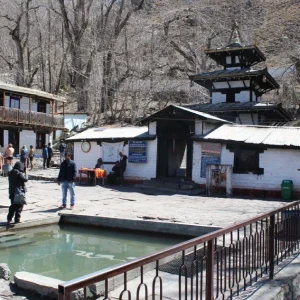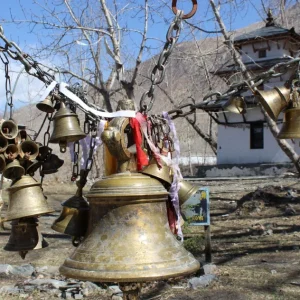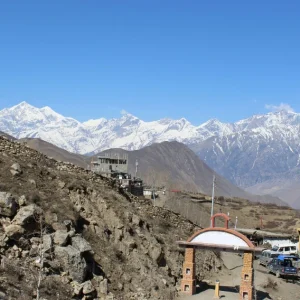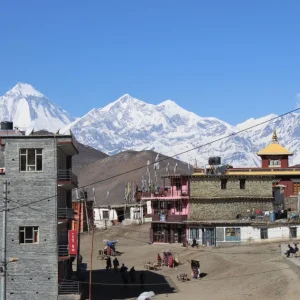Plan to Visit Muktinath, Register with us today!!
Muktinath Temple: An Updated Guide for 2026-27
Muktinath Temple Guide for 2026-27
106th of the 108 Divya Desam, the Muktinath temple is located at an altitude of 3, 800 meters above sea level in the Mustang region of Nepal. The word “Muktinath” or “Mukthinath” or “Muktinath Temple” holds great religious essence for people residing in the South Asian subcontinent. It acts as a site of religious symbiosis for Hindus and Buddhists.
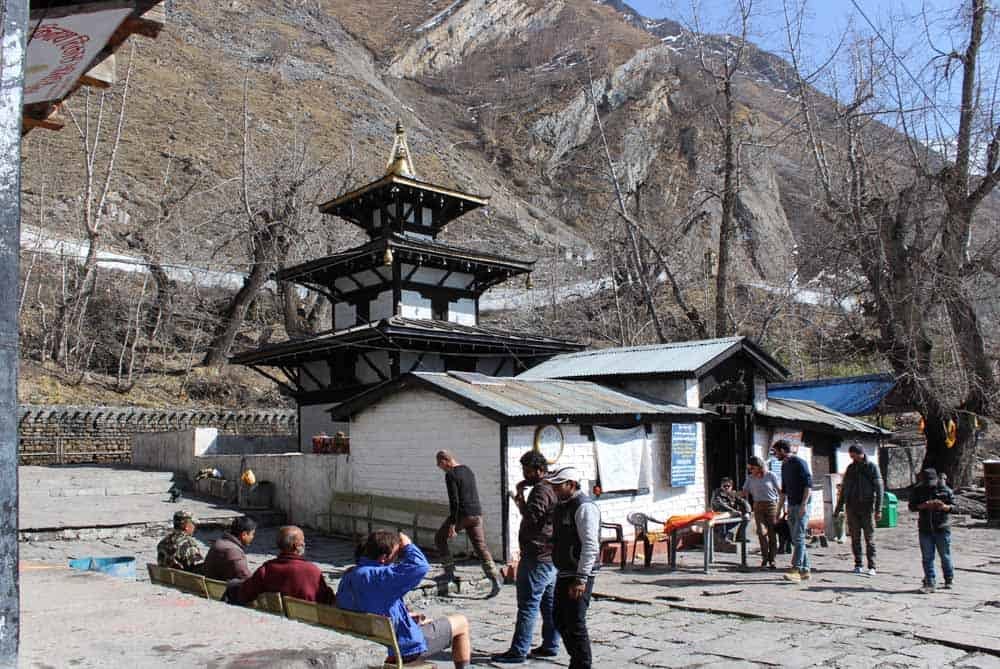
Muktinath Dham is latched by snowcapped mountains and called is called Muktikshetra (which literally means place of salvation) by Hindu devotees. The term ‘Divya Desam’ stands for 108 Vishnu temples. Of all the Hindustani devotees coming here, at least 20% of them embark on this journey for the thrill of it – the rugged terrain, beautiful scenery and spirituality attract them. As Divine Kailash keeps your safety a priority, our team maintains proper COVID-19 safety and precautions throughout your Muktinath mandir tour.
Three important Divya Desams at Muktinath Dham where, according to Hindu believes, one can witness Lord Vishnu in three positions are:
- Kidantha Thirukkolam – Sleeping position.
- Veetrirundha Thirukkolam – Sitting position.
- Nindra Thirukkolam – Standing position.
The temple in Nepal is considered to be a perfect ‘place of liberation.’ Buddhists regard this place as Chumig Gyatsa, meaning hundred waters. It is one of the 24 Tantric places. The Muktinath idol is one of the eight shrines, namely Tirupati, Srimushnam, Pushkaram, Srirangam, Badrinath, Thothadri, and Naimisaranyam. The divine Muktinath mandir is considered to have appeared on its own. These premium Muktinath Dham temples are considered divinely holy by the Vaishnava sect, and their literature goes back to 1000 BCE.
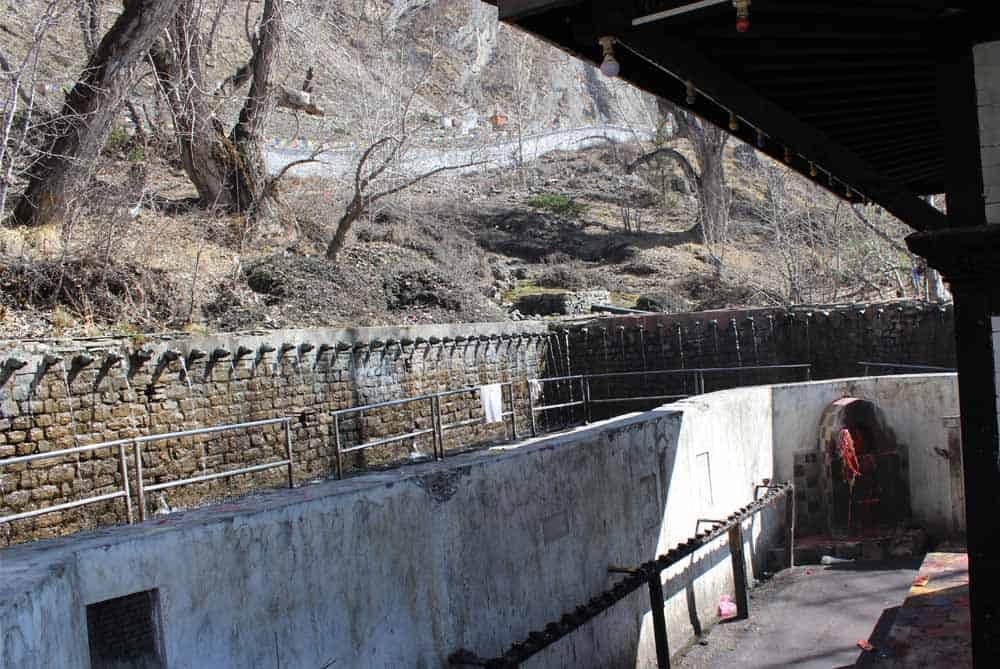
The significance of the name “Muktinath” has a religious connotation with a sort of emotional ring to it. This Sanskrit name is a synthesis of two words- Mukti Nath. “Mukti” signifies Salvation or Nirvana and the term “Nath”. According to mythology, it is believed that the world is “MAYA” or the illusion of a life cycle of birth and rebirth. Many devotees consider this place as a holy site. Thousands of people flock to come here to find solace and nirvana in the temple each year.
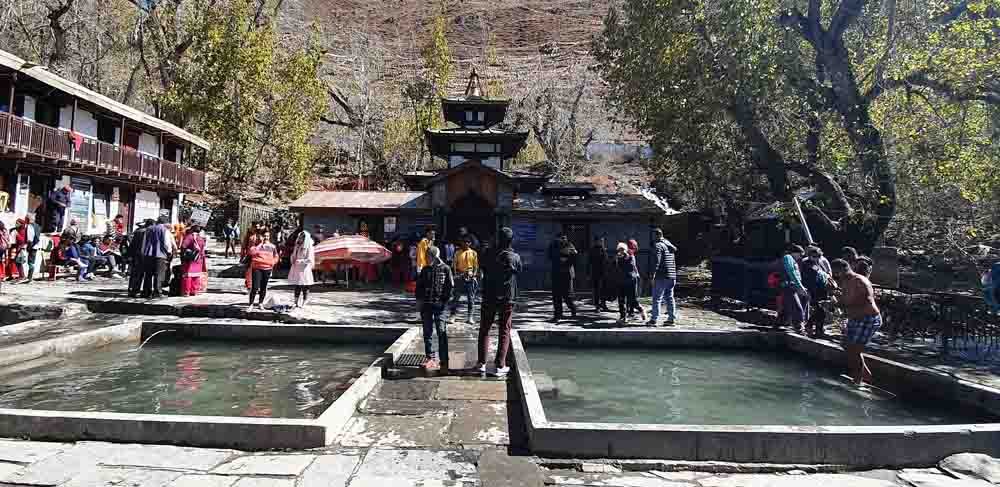
Muktinath Temple History
The Muktinath Temple history finds various connotations from different holy texts of Buddhist and Hindu traditions. According to one belief, Lord Vishnu converted into Shaligram due to the Curse of Brinda. Lord Vishnu found his salvation in the Muktinath Temple location. That is why Hindus worship Lord Vishnu, the Temple God, here. On the other hand, the Buddhists adore Lord Vishnu as Avalokiteshvara (Buddha). Muktinath is a very old Temple of Lord Vishnu. The Vishnu temple also has a religious link with Lord Krishna and Lord Shiva.
A significant event in the Muktinath Temple history is the instigation of the structure of this temple dedicated to Lord Vishnu and Chenrezig at Chumig Gyatsa in 1815 by Queen Subarna Prabha. The queen measured Muktinath-Chumig Gyatsa as Salagrama. As per old myths about Muktinath Temple, Salagrama was a sacred site linked to the River Kali Gandaki, whose riverbed is the only place where Shaligram stones can be found. The temple is also revered in Nalayira Divya Prabandha.
At different times in the history of Muktinath, various saints such as Padmasambhava and Mahasiddhas blessed the places with their meditation increasing the importance of Muktinath temple. The Tibetan Buddhist nuns are the customary concierges of the temple and there is always a Buddhist monk present to worship. Tibetan Buddhists believe that the Muktinath Temple location houses twenty-one Taras and Muktinath Temple God and goddesses like Lakshmi, Saraswati, and more. Connect with Divine Kailash today for more details.
How To Reach Muktinath Temple of Nepal?
The Muktinath Temple tour via roadway takes around two nights. The journey starts from Kathmandu while traveling through Pokhara(Pokhara to Muktinath temple distance is 176.4 km) following the Prithvi Highway to Jomsom via Beni, Tatopani, Ghasa, and Marpha, and finally reaching Muktinath Temple.
The journey starts via a jeep from Kathmandu to Pokhara (206 km), and it takes around 7 hours to cover the distance. After a 7 hours-long journey, the first halt is at Pokhara, where you can spend an overnight. Here you will find different hotels, malls, restaurants, and top-notch facilities. You will also witness varieties of food and live music at various cafes in Pokhara on our Muktinath temple tour package.
The next day, according to the Muktinath temple in map of nepal, the journey starts from Pokhara to Jomsom, 170 km ahead of Pokhara. It usually takes 8-9 hours to reach Jomsom while passing through Beni, Tatopani, Ghasa. The roads down to Beni (100 km) are comfortable. However, the rest of the Muktinath Temple tour of the 70 km journey is off-road. After Beni, the road goes alongside the Kali Gandaki River till Muktinath. The following day, take a jeep and reach Ranipurwa (3, 710 meters).
Then hike for 25 minutes, and then you finally reach the temple entrance (3, 800 meters). You can pay your homage on the same day and drive back to Pokhara. You can also stop at Beni, or Lete if you want to see other places.
To start the journey, you must fly from Kathmandu to the airport of Pokhara, a journey of 25 minutes. From Pokhara, you take another 25 minutes flight to Jomsom. From Jomsom airport, you need to reach the entrance of Muktinath Temple by driving which is 25 KMs. The nearest airport for your Muktinath Temple tour is Jomsom. There are only early morning flights from Pokhara to Jomsom, only if the weather permits. Therefore, you must halt at Pokhara for a night to board the flight the following day. Contact us now for the full itinerary.
Frequently Asked Questions About the Muktinath Temple Tour
The Muktinath Temple’s entrance gate opens at 5 AM in the morning and closes at 8:30 PM in the evening. The best time for Lord Vishnu worshipping while the Muktinath temple open timings, is 8 AM to 7 PM.
The temple is situated in the Lower Mustang region of Nepal at a height of 3, 800 meters on the outskirts of the village Ranipurwa, which is 24 kilometers from Jomsom town.
